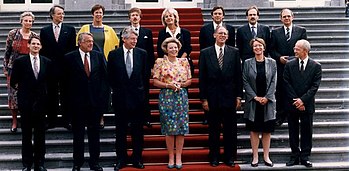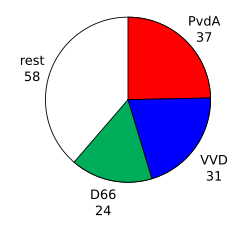Netherlands cabinet Kok-1
| First Kok cabinet First Purple cabinet |
|
|---|---|
|
62nd cabinet of the Netherlands |
|
 
The installation of the First Kok cabinet on 22 August 1994
|
|
| Date formed | 22 August 1994 |
| Date dissolved | 3 August 1998 (Demissionary from 6 May 1998) |
| People and organisations | |
| Head of state | Queen Beatrix |
| Head of government | Wim Kok |
| Deputy head of government |
Hans Dijkstal Hans van Mierlo |
| No. of ministers | 14 |
| Member party |
Labour Party (PvdA) People's Party for Freedom and Democracy (VVD) Democrats 66 (D66) |
| Status in legislature | Grand coalition (Purple) |
| Opposition party | Christian Democratic Appeal |
| Opposition leader |
Enneüs Heerma (1994–1997) Jaap de Hoop Scheffer (1997–1998) |
| History | |
| Election(s) | 1994 election |
| Outgoing election | 1998 election |
| Legislature term(s) | 1994–1998 |
| Incoming formation | 1994 formation |
| Outgoing formation | 1998 formation |
| Predecessor | Third Lubbers cabinet |
| Successor | Second Kok cabinet |
The First Kok cabinet, also called the First Purple cabinet was the cabinet of the Netherlands from 22 August 1994 until 3 August 1998. The cabinet was formed by the political parties Labour Party (PvdA), People's Party for Freedom and Democracy (VVD) and the Democrats 66 (D66) after the election of 1994. The grand coalition (Purple) cabinet was a majority government in the House of Representatives.
The Democrats 66 had won its greatest political victory with the slogan that the Christian Democratic Appeal should be in the opposition for a change. The desire to form a cabinet without the Christian Democrats was based on the pivotal role in the political center that the Christian Democratic Appeal played in Dutch politics. The Christian Democratic Appeal had been in government continuously since its formation in 1980, and at least one of its three antecedents had been in government since 1918. The cabinet consisted of 13 Ministers, 1 Minister without portfolio and 12 State Secretaries. The positions where divided among the coalition members according of their respective size: Labour Party (37 seats) supplied 5 Ministers and 5 State Secretaries, People's Party for Freedom and Democracy (31 seats) supplied 5 Ministers and 4 State Secretaries, Democrats 66 (24 seats) supplied 4 Ministers and 3 State Secretaries.
...
Wikipedia
